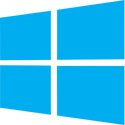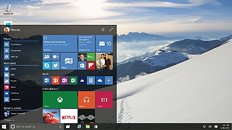Thursday, May 14th 2015

Microsoft Reveals Windows 10 Variants
Microsoft revealed the six variants in which its next operating system, Windows 10, will ship in. The company decided to unify the Windows 10 brand across its PC, workstation, and handheld platforms. For PCs, workstations, and tablets running x86 processors, the lineup will include the Windows 10 Home, Windows 10 Pro, Windows 10 Education, and Windows 10 Enterprise.
Windows 10 Home has everything a home and small-business user could ask for (including PC gamers and enthusiasts). It will include the Edge web-browser (so your post-install waltz to Chrome or Firefox websites is a few seconds faster), Microsoft Cortana voice-based assistant, richer Bing integration, Microsoft Hello face-recognition software, and support for biometric login methods. Gamers get DirectX 12 out of the box. Users of Windows 7 Home Premium and Windows 8/8.1 get a free upgrade to this edition.Windows 10 Pro adds features for power-users, such as advanced data protection, remote- and mobile-access, additional cloud features, and remote management for medium-sized businesses. Users of Windows 7 Professional, Ultimate, and Windows 8/8.1 Pro get a free upgrade to this edition.
Windows 10 Education is a brand new SKU designed for schools, colleges, and universities. It will come with features to meed the needs of educators (teachers, management, exam-controllers, computer labs, etc.,). This edition will be sold through specially priced volume licensing to entire counties, groups of institutions, and universities.
Windows 10 Enterprise will be designed for desktops and workstations in a very-large enterprise environment, in which individual machines are expendable, and user data is centralized and portable between machines. It will come with advanced networking, data-security, and remote management features.
In addition, Microsoft is readying two variants of its operating system for smartphones and tablets - Windows 10 Mobile, and Windows 10 Mobile Enterprise. Windows 10 Mobile will be targeted at consumer smartphones, and will have a rich feature-set for communication, social-networking, and productivity; while Windows 10 Mobile Enterprise will be designed for devices given by companies to their employees, with access to privileged information and services.
Unfortunately, and breaking tradition, Microsoft didn't disclose box-art, marking Windows' transition from optical disc media, to one that's distributed by any which way possible, while Microsoft only sells licenses (keys). The company already gives away ISO disc images and USB flash drive install media creation tools for Windows 8.1 on its website; while selling licenses.
Windows 10 Home and Windows 10 Pro, will be offered as free-forever upgrades to users of equivalent variants of Windows 7 and Windows 8/8.1, if they upgrade within the first year of Windows 10 launch. Those using pirated Windows 7 may find the upgrade "free," but Microsoft has a slew of anti-piracy measures in store, which kick in after the upgrade.
Microsoft could dramatically change the way it monetizes Windows, in the near future. Gone will be the static $100-ish licenses, and the company will sell Windows as a service, much like Office 365. You choose your desired variant, and pay for using it, monthly or annually. We imagine unpaid installations suffering a worse fate than merely not getting software updates - the OS could become unusable after a "grace period," until you pay up.
On the upside, the monthly or annual fees for each edition could end up quite cheap. Also, the version will no longer be relevant. Microsoft will keep adding big new features every so often (which you normally expect from new versions that require you to buy new licenses). Windows will sell a lot like Office 365 and Adobe Creative Cloud.
Windows 10 will be released in July, in 111 languages, and in 190 countries.
Windows 10 Home has everything a home and small-business user could ask for (including PC gamers and enthusiasts). It will include the Edge web-browser (so your post-install waltz to Chrome or Firefox websites is a few seconds faster), Microsoft Cortana voice-based assistant, richer Bing integration, Microsoft Hello face-recognition software, and support for biometric login methods. Gamers get DirectX 12 out of the box. Users of Windows 7 Home Premium and Windows 8/8.1 get a free upgrade to this edition.Windows 10 Pro adds features for power-users, such as advanced data protection, remote- and mobile-access, additional cloud features, and remote management for medium-sized businesses. Users of Windows 7 Professional, Ultimate, and Windows 8/8.1 Pro get a free upgrade to this edition.
Windows 10 Education is a brand new SKU designed for schools, colleges, and universities. It will come with features to meed the needs of educators (teachers, management, exam-controllers, computer labs, etc.,). This edition will be sold through specially priced volume licensing to entire counties, groups of institutions, and universities.
Windows 10 Enterprise will be designed for desktops and workstations in a very-large enterprise environment, in which individual machines are expendable, and user data is centralized and portable between machines. It will come with advanced networking, data-security, and remote management features.
In addition, Microsoft is readying two variants of its operating system for smartphones and tablets - Windows 10 Mobile, and Windows 10 Mobile Enterprise. Windows 10 Mobile will be targeted at consumer smartphones, and will have a rich feature-set for communication, social-networking, and productivity; while Windows 10 Mobile Enterprise will be designed for devices given by companies to their employees, with access to privileged information and services.
Unfortunately, and breaking tradition, Microsoft didn't disclose box-art, marking Windows' transition from optical disc media, to one that's distributed by any which way possible, while Microsoft only sells licenses (keys). The company already gives away ISO disc images and USB flash drive install media creation tools for Windows 8.1 on its website; while selling licenses.
Windows 10 Home and Windows 10 Pro, will be offered as free-forever upgrades to users of equivalent variants of Windows 7 and Windows 8/8.1, if they upgrade within the first year of Windows 10 launch. Those using pirated Windows 7 may find the upgrade "free," but Microsoft has a slew of anti-piracy measures in store, which kick in after the upgrade.
Microsoft could dramatically change the way it monetizes Windows, in the near future. Gone will be the static $100-ish licenses, and the company will sell Windows as a service, much like Office 365. You choose your desired variant, and pay for using it, monthly or annually. We imagine unpaid installations suffering a worse fate than merely not getting software updates - the OS could become unusable after a "grace period," until you pay up.
On the upside, the monthly or annual fees for each edition could end up quite cheap. Also, the version will no longer be relevant. Microsoft will keep adding big new features every so often (which you normally expect from new versions that require you to buy new licenses). Windows will sell a lot like Office 365 and Adobe Creative Cloud.
Windows 10 will be released in July, in 111 languages, and in 190 countries.

105 Comments on Microsoft Reveals Windows 10 Variants
BSOD - Blue Screen Of Debt.
Please choose payment option to restore your last working session. $$$
Windows doesn't need to be their cash cow anymore, they've recognized that they'll end up making more money by keeping it up to date and building their install base.
Satya Nadella's Microsoft is a totally different company. Just take a look at all the momentum they're building in Open Source. That was 100% unheard of under Gates and Ballmer. Windows with free rolling releases was unheard of too, but it IS happening.
As an aside, they will not allow developers or others to sell through their APP store, so all profits remain their.
They are once again trying to create a closed market.
why dont they make it simple for people
and they like wanna push the market to follow their way, remember when win 8 MS said that its better with tiles and we see now MS bring the start menu back
could be this time MS would act the same, test the water and see it works or not
For those that think that MS is in any way worried about their install base just ask yourself where else can you turn to anyway no matter what MS does. Most people don't use Apple at work except for the ipad as a mobile accessory. They've got around 90% of the PC OS market last time I checked. If you're a gamer then you need MS too.
This is the same company that wanted to make the Xbox One always online and force you to pay $100 more for Kinect whether you wanted it or not. The Xbox One was $100 more expensive at release than the superior PS4 console.
It being totally locked down would be bad, but the idea of an app store is great, and for some reason people think app store = walled garden. What does even Linux have that MS doesn't? App stores (because that is exactly what the packet managers in Linux is, but much worse from a user perspective). Now the internet is awash with terrible programs (not to mention malware/adware) because people have no idea where to turn to get their precious SYSTEMBOOOOOSTEERSRSS. With a moderated app store much of this is not a problem anymore.
And you do not need system boosters, you only have to use programs like CCleaner and know how to manage services and most importantly you have to use settings in programs to change program behaviour.
Now, obviously an app store shouldn't be the only way to do things, but IMO it should very well be the main way, from a user perspective. In a perfect world we wouldn't even have GUI's because we'd all be Unix-gurus, wars wouldn't exist, software and beer would flow freely and a google would be a person wearing goggles. In the real world, software makers put Conduit with their installers.
It's also bad when you attempt to define a "PC." Because is my PC the same PC it was 5 years ago? Same case, but pretty much same nothing else. And I sure as hell don't think I should have to pay for a software upgrade when all I do is upgrade my hardware.
www.nextpowerup.com/news/21356/microsoft-addressing-junk-apps-with-new-windows-store-policy/
i think it could end up being good
How about this:
"Once a qualified Windows device is upgraded to Windows 10, we will continue to keep it up to date for the supported lifetime of the device..."
If is my PC, what device are we talking about?? I upgrade my PC from time, so basically stuff always change inside it. Again, the same question I've asked before and still no clear answer.
However, as long as I can upgrade my current 8.2 machine to 10 and not worry about subscriptions I'll be happy. I'll walk the other bridges as we come to them.
If you buy a retail version for 200$ then you can change motherboards and the license will work.